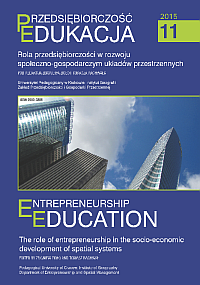Entrepreneurship development programming by local and regional government
DOI:
https://doi.org/10.24917/20833296.11.4Keywords:
entrepreneurship, local self-government, strategic management, strategic planning, strategies of developmentAbstract
The article refers to the planning of entrepreneurship development by local self-governments. Itis therefore embedded in the issues of strategic management in public institutions. The exampleof entrepreneurship as part of the endogenous potential of strategic intervention was chosen becauseit emphasised the role of this phenomenon not only in scientific studies, but also in a numberof strategic documents and local self-government practices.The primary purpose of this article is therefore to define the attributes of an effective mechanismfor supporting entrepreneurship by local self-government institutions. What is helpful in pursuingthis objective, are literature studies on such issues as entrepreneurship, strategic management,or the transfer of the concept of governance and New Public Management to local self-government development management practice. Clarification of the issue has not been narrowed down only totheory. Content analysis was also performed with respect to the strategic documents and the casestudy method was also employed.
References
Audretsch, D., Thurik, R. (2004). A model of Entrepreneurial Economy. The Papers of Entrepreneurschip, Growth and Public Policy. Jena: Max Planck Institute.
Boxwell, R.J. (1994). Benchmarking for Competitive Advantage. New York: McGraw-Hill.
Carree, M.A., Thurik, A.R. (2010). The impact of Entrepreneurship on Economic Growth. W: J.A Zlotan, D.B. Audretsch (red.) (2010). Handbook of Entrepreneurship Research. II ed., New York-Dordrecht- -Heidelberg-London: Springer, 557-594.
Dałkowski, B., Staśto, L., Zalewski, M. (red.) (2009). Polskie Wytyczne Kompetenc ji IPMA. Gdańsk: Stowarzyszenie Project Management Polska.
Długookresowa Strategia Rozwoju Kraju – Polska 2030. Trzecia fala nowoczesności. (2013). Warszawa: Ministerstwo Administracji i Cyfryzacji.
Programowanie rozwoju przedsiębiorczości przez samorząd terytorialny 61 Drucker, P.F. (2002). Myśli przewodnie Druckera. Warszawa: MT Biznes.
Dzimianowicz, W. (2012). Planowanie strategiczne: poradnik dla pracowników administracji publicznej. Warszawa: MRR.
Gawroński, H. (2010). Zarządzanie strategiczne w samorządach lokalnych. Warszawa: Wolters Kluwer Polska.
Harmaakorpi, V. (2010). Metoda Platformy Rozwoju Regionalnego jako narzędzie polityki innowacyjnej. Warszawa: PARP.
Henrekson, M., Stenkula, M. (2010). Entrepreneurship and Public Policy. W: J.A Zlotan, D.B. Audretsch (red.) (2010). Handbook of Entrepreneurship Research. II ed., New York-Dordrecht-Heidelberg-London: Springer, 639-660.
Jeżowski, P. (2002). New Public Management – nowy paradygmat zarządzania w sektorze publicznym. W: P. Jeżowski (red.), Zarządzanie w sektorze publicznym – rozwój zrównoważony – metody wyceny. Warszawa: Wydawnictwo SGH.
Krajowa Strategia Rozwoju Regionalnego 2010–2020: Regiony, Miasta, Obszary Wiejskie. (2010). Warszawa: Ministerstwo Rozwoju Regionalnego.
Leydesdorff, L. (2006). The Kowledge-Based Economy: Modeled, Measured, Simulated. Boca Raton: Universal Publishers,.
Potoczek, A. (2013). Zarządzanie jednostką terytorialną. Wybrane zagadnienia. Bydgoszcz: Wydawnictwo Uczelniane Wyższej Szkoły Gospodarki.
Potoczek, A., Pyrzyk, I. (2013). Administracja i zarządzanie. Perspektywa Społeczna i organizacyjna. Włocławek: Wyższa Szkoła Humanistyczno-Ekonomiczna.
Prusak, A., Stefanów, P. (2014). AHP – analityczny proces hierarchiczny. Budowa i analiza modeli decyzyjnych krok po kroku. Wyd 1., Warszawa: C.H. Beck.
Saaty, T. (2014). The Neural Network Process, Generalization of the AHP and ANP to Continuous Case of Neural Firing. Pitzburg: RWS Publications.
Saaty, T. (2000). Fundamentals of Decision Making and Priority Theory with the Analytic Hierarchy Process. 2nd ed., Pitzburg: RWS Publications, 527.
Schumpeter, J.A. (1995). Kapitalizm, socjalizm, demokracja. Warszawa: Wyd. Naukowe PWN.
Skica, T., Strojny, J. (2013). Orientacja projektowa jako systemowe wspieranie kontroli zarządczej w jednostkach samorządu terytorialnego. Samorząd Terytorialny, 4, 49-63.
Strategia na rzecz inteligentnego i zrównoważonego rozwoju sprzyjającego włączeniu społecznemu Europa 2020. (2010). Bruksela: Komisja Europejska.
Strategia Rozwoju Kapitału Ludzkiego. (2013). Warszawa: Ministerstwo Pracy i Polityki Społecznej.
Strategia Rozwoju Kraju 2020. Aktywne społeczeństwo, konkurencyjna gospodarka, sprawne państwo (2012). Warszawa: Ministerstwo Rozwoju Regionalnego.
Strategia Rozwoju Społeczno-Gospodarczego Powiatu Nowotarskiego. (2014). Nowy Targ: Starostwo Powiatowe.
Strategia Rozwoju Województwa – Podkarpackie 2020. (2013). Rzeszów: Samorząd Województwa Podkarpackiego.
Strategia Innowacyjności i Efektywności Gospodarki. (2013). Warszawa: Ministerstwo Gospodarki.
Strategia Zintegrowanego i Zrównoważonego Rozwoju Miasta Gliwice do roku 2020. (2011). Gliwice: Samorząd Miasta.
Strojny, J. (2012). Innowacyjne zarządzanie regionem, powiatem i gminą. Rzeszów: Politechnika Rzeszowska.
Strojny, J. (2013). Orientacja zadaniowa jako systemowe podejście do zarządzania oparte na filozofii zarządzania projektami. W: T. Listwan, Ł. Sułkowski, Ekonomiczne i sprawnościowe problemy zarządzania projektami. Łódź: Społeczna Akademia Nauk, 185-196.
Szewczuk, A., Kogut-Jaworska, M., Zioło, M. (2011). Rozwój lokalny i regionalny. Teoria i praktyka. Warszawa: Wydawnictwo C.H. Beck.
Ustawa z dnia 5 czerwca 1998 r. o samorządzie województwa. Dz.U. 1998 nr 91, poz. 576.
Ustawa z dnia 5 czerwca 1999 r. o samorządzie powiatowym. Dz.U. 1998 nr 91, poz. 578.
Ustawa z dnia 8 marca 1990 r. o samorządzie gminnym. Dz.U. 1990 nr 16, poz. 95.
Wach, K. (2008) Regionalne otoczenie małych i średnich przedsiębiorstw. Kraków: Wydawnictwo UEK.
Wawrzyniec, R. (2010). Koncepcja governance i jej zastosowanie – od instytucji międzynarodowych do niższych szczebli władzy. Acta Universitatis Lodziensis.
Wodecka-Hyjek, A. (2013). Paradygmat przedsiębiorczości w perspektywie wybranych reprezentantów klasycznej szkoły organizacji i zarządzania. Studia i Materiały. Miscellanea Oeconomicae, 2, Kielce: Uniwersytet Jana Kochanowskiego.
Wolcott, R.C, Lippitz, M.J. (2007). The Four Models of Corporate Entrepreneurship. MIT Sloan Management Review, 74-83.
Downloads
Published
How to Cite
Issue
Section
License
Articles are published under the terms of the Creative Commons License (CC BY-ND 4.0; Attribution– NoDerivs).

